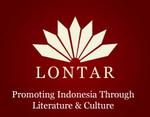
Sapardi Djoko Damono was an Indonesian poet known for lyrical poems, and who was widely regarded as the pioneer of lyrical poetry in Indonesia. He died in South Tangerang, Banten on 19 July 2020 after a long illness.
I Gusti Ngurah Putu Wijaya, better known simply as Putu Wijaya, was born in Tabanan, Bali. He is an Indonesian author, considered by many to be one of Indonesia's most prominent literary figures. His output is impressive; his published works include more than thirty novels, forty dramas, a hundred short stories, and thousands of essays, articles, screenplays and television dramas, and he has been the recipient of a number of literary prizes.
Subagio Sastrowardoyo was an Indonesian poet, short-story writer, essayist and literary critic. Born in Madiun, East Java, the Dutch East Indies, he studied at Gadjah Mada University, Cornell University and in 1963 graduated with an MA from Yale University. His debut as a writer came early with the publication of Simphoni (Symphony), a collection of poems, in 1957. The collection has been described as "cynical, untamed poetry, shocking sometimes". Simphoni was followed by several attempts at short story writing, including the publication Kedjananan di Sumbing, before Subagio settled on poetry as his main creative outlet. Following an extended stay in the United States he published a collection of poems entitled Saldju (Snow) in 1966. The poems in this collection deal with questions of life and death, and of the need for "something to hold on to in an existence threatened on all sides", and have been described as altogether more restrained than those in his earlier work. Additional works published since 1966 include Daerab Perbatasan (1970), Keroncong Motinggo (1975), Buku Harian (Diary), Hari dan Hara (1979)Simphoni Dua (1990), and several books of literary criticism. Subagio's collected poems have been published as Dan Kematian Makin Akrab (1995).
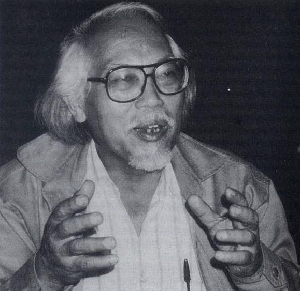
Yusuf Bilyarta Mangunwijaya, was an Indonesian architect, writer, and Catholic religious leader. He was popularly known as Romo Mangun.

Sitor Situmorang was an Indonesian poet, essayist and writer of short stories. Situmorang was born in Harianboho, North Sumatra, and educated in Jakarta. He worked as a journalist and literary critic in Medan, Yogyakarta and Jakarta for a variety of newspapers and periodicals.

Hans Bague Jassin, better known as HB Jassin, was an Indonesian literary critic, documentarian, and professor. Born in Gorontalo to a bibliophilic petroleum company employee, Jassin began reading while still in elementary school, later writing published reviews before finishing high school. After a while working in the Gorontalo regent's office, he moved to Jakarta where he worked at the state publisher Balai Pustaka. After leaving the publisher, he attended the University of Indonesia and later Yale. Returning to Indonesia to be a teacher, he also headed Sastra magazine. Horison, a literary magazine, was started in July 1966 by Jassin and Mochtar Lubis as a successor to Sastra, and was edited by Taufiq Ismail, Ds. Muljanto, Zaini, Su Hok Djin, and Goenawan Mohamad. In 1971, Jassin was given a one-year prison sentence and a two-year probation period because as the editor of Sastra, he refused to reveal the identity of an anonymous writer who wrote a story which was considered by the court to be blasphemous.

Christophorus Apolinaris Eka Budianta Martoredjo, also known as C. A. Eka Budianta, more commonly known as Eka Budianta is an Indonesian poet. He was born into a Catholic family and was the second child of nine. His grandparents were farmers. His parents were public elementary school teachers. His father later worked at the local office for the Ministry Education and his mother became a school principal. After graduating from St. Albertus high school in Malang (Dempo), he attended the Lembaga Pendidikan Kesenian Jakarta, now known as Institut Kesenian Jakarta but did not complete his studies. From 1975 to 1979, Eka Budianta studied Japanese literature at the Department of East Asian Studies Literature then changed to the Department of History, Faculty of Letters, University of Indonesia. He then studied journalism at Los Angeles Trade-Technical College in the United States from 1980–81.

Agam Wispi is an Indonesian poet.
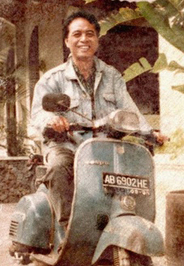
Linus Suryadi Agustinus, commonly known Linus Suryadi AG or Linus Suryadi AGN was born in Sleman, Indonesia on 3 March 1951 and died in Yogyakarta on 30 July 1999 at the age of 48.

Toeti Heraty was an Indonesian poet. She has been singled out as the "only woman amongst the leading contemporary Indonesian poets".
Ida Ayu Oka Rusmini, known as Oka Rusmini, is an Indonesian poet and novelist. She is a recipient of the S.E.A. Write Award.
Ismail Marahimin was an Indonesian writer. He was born in Medan, North Sumatra.
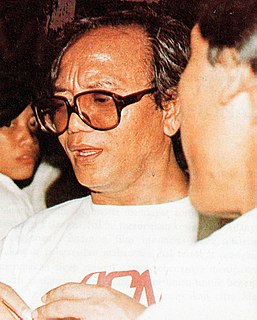
Arifin Chairin Noer was an Indonesian poet, theater director and film producer.
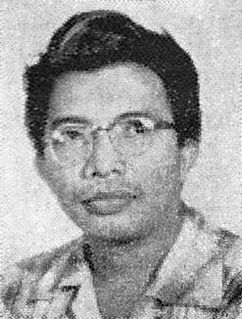
Iwan Martua Lokot Dongan Simatupang, more commonly known as Iwan Simatupang was an Indonesian novelist, poet and essayist.
John H. McGlynn is an American editor and translator.
Indonesian exile literature refers to works of Indonesian literature produced by writers living in exile after the 30 September Movement led an abortive coup d'état in 1965. This applies especially those living in Western Europe, with a focus on the Netherlands. Exile literature is not a literary school, but rather a literary incarnation of a unique political situation.
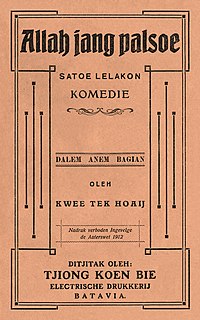
Allah jang Palsoe is a 1919 stage drama from the Dutch East Indies that was written by the ethnic Chinese author Kwee Tek Hoay based on E. Phillips Oppenheim's short story "The False Gods". Over six acts, the Malay-language play follows two brothers, one a devout son who holds firmly to his morals and personal honour, while the other worships money and prioritises personal gain. Over more than a decade, the two learn that money is not the path to happiness.
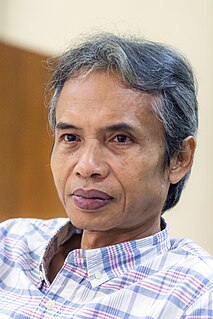
Joko Pinurbo is an Indonesian poet. His poetry is a mixture of narrative, irony, and self-reflection.
Leon Agusta was an Indonesian literary figure.
Saini KM is an Indonesian writer. He is known for his award-winning dramas, and has also written poetry, prose and non-fiction. He served as literature editor of the newspaper Pikiran Rakyat; as a lecturer at the Indonesian Academy of Dance in Bandung, and sat on the Bandung Regional People's Representative Council. He has won numerous awards for his work, including most recently the SEA Write Award (2011). He has been called "one of the leading playwrights of the New Order".
